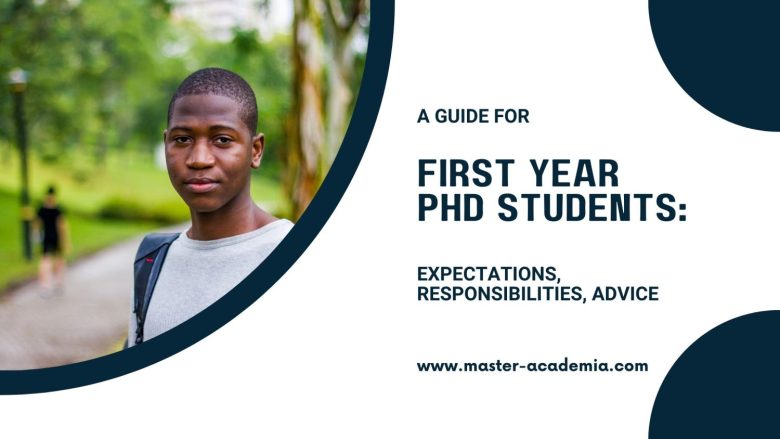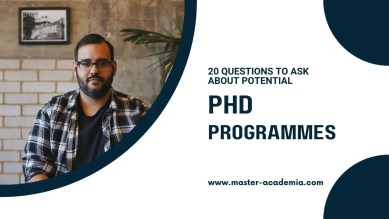
The first year of a PhD can feel like a rollercoaster ride. First-year PhD students are ambitious and want to fulfil expectations. At the same time, they may be unsure of what these expectations and their responsibilities are. This guide aims to provide first-year PhD students with some directions and advice.
Disclaimer: This post may contain affiliate links, which means I may earn a small commission if you make a purchase using the links below at no additional cost to you. I only recommend products or services that I truly believe can benefit my audience. As always, my opinions are my own.
Contents
The first year as a PhD student: Excitement, ambition, overwhelm
Starting a PhD is exciting. Securing a PhD position is a major life event, and often something that first-year year PhD students have been working towards for a long time.
Many PhD students cannot wait to start. They already want to prepare in the weeks and months leading up to their new positions. And once they do start, they are full of energy, ambitions and plans.
First-year PhD students want to do well, make progress with their projects and meet their supervisors’ expectations. However, it is not always clear what that means.
“Am I doing enough? Do I make enough progress? Am I smart enough? Did I bite off more than I can chew?”
Questions like these, and insecurities, often develop early on in a PhD journey.
Furthermore, starting in a new environment can also be draining. There are new colleagues, new processes, and many unwritten rules in academia. Coupled with open questions about the direction of one’s PhD research, the first year can feel overwhelming.
What to expect as a first-year PhD student
To avoid overwhelm, it helps to know that the first year of a PhD involves much more than just figuring out one’s research. And absolutely normal to feel lost from time to time.
Succeeding in academia has many facets, including your thesis or dissertation, but also learning new skills, and developing relationships with supervisors, colleagues and scholars in your field. All of that takes energy.
Set realistic expectations for yourself in the first year of your PhD. Not everything will work out as planned. Research takes time, and setbacks are inevitable.
Doing a PhD is often experienced as very stressful: many PhD students are perfectionists, and a PhD requires a lot of self-responsibility. Consequently, PhD work tends to feel very personal, and criticism can sting.
First-year PhD students can deal with ‘failures’ more constructively by realizing that failures are an inevitable part of academic work, and by adopting a more welcoming attitude to criticism and feedback.
First-year PhD students can also expect to read and explore a lot. At times, this involves going down the rabbit hole of academic literature: processing new information, frameworks and perspectives before discarding them again.
Thinking, researching, experimenting, writing and editing are not straightforward processes, and a lot of learning takes place along the way.
Responsibilities of a first-year PhD student
Specific requirements and responsibilities of a first-year PhD student differ from programme to programme.
However, frequently a key responsibility of a PhD student is to develop a firm research proposal in the first year, which is often coupled with an extensive literature review.
This requires first-year PhD students to immerse themselves in the relevant literature. However, it is also recommended to read a bit outside of your field or discipline to gain new perspectives.
If a PhD programme involves course work, as is for instance the case in North America much more than in Europe, then planning and starting coursework is also often a responsibility during the first year.
All in all, a first-year PhD student is responsible to get organised and create a feasible plan for the coming years. The first year is meant to set the foundation for the PhD trajectory.
Unless the PhD programme is followed online, and unless there is a pandemic raging, first-year PhD students are additionally often expected to actively participate in the research group, lab or department in which they are based.
Active participation can range from simply showing up regularly, to attending lunches with colleagues, attending research events or presenting preliminary findings.

A supervisor’s expectations of a first-year PhD student
The internet is full of horror stories of PhD supervisors having extremely unrealistic expectations of first-year PhD students. For instance, several publications in the first year.
While this can certainly happen, I dare to say that this is not the norm.
Again, specific expectations or requirements in terms of performance and output of first-year PhD students can differ from university to university, and from supervisor to supervisor.
Beyond that, however, there are several expectations that many PhD supervisors have of first-year PhD students.
For instance, PhD supervisors tend to appreciate some levels of regularity and consistency. While it is absolutely normal to have periods where you make more progress (for instance in writing) than in others, it is not good to contact your supervisor every day for a month, and then fall off the earth for half a year.
Consistency goes hand in hand with good communication. Communication, respect and openness are fundamental elements in a good supervisor-supervisee relationship.
Many supervisors prefer first-year PhD students to ask for help and support if they experience roadblocks of any kind, instead of finding out that after a year no progress was made.
Lastly, supervisors often expect PhD students to take matters into their own hands. Instead of simply waiting for instruction, this means that first-year PhD students should be in the driver’s seat of their journey. Therefore, it is no surprise that proactiveness is one of the 10 qualities of successful PhD students.
25 things every first year PhD student should do
To turn the more abstract discussion on expectations and responsibilities into more concrete advice, the following list includes 25 things (divided into five categories) that every first-year PhD student should do.
Thesis/Dissertation
- Read as much as you can. Write down your thoughts and observations.
- Develop a system to keep track of the literature you are reading (for instance through an excel file, notebooks, or a reference manager like Zotero).
- Develop a literature review on your research topic.
- Familiarise yourself with your university’s PhD requirements (such as length, number of publications, required coursework, etc.).
- Read a few PhD theses from your field and university to understand what is ultimately expected from you.
Academic skills
- Get into the habit of writing. It does not have to be purely academic text. Write down your observations, write blog posts, and write a research diary. The more you write, the easier it gets.
- Develop a good system of communication and effective supervision meetings with your PhD supervisor/s.
- Get into the habit of talking about your research. Speak to your friends about your work, and discuss some readings with your colleagues. Try to formulate your thoughts in an accessible way. The more you do this, the easier it gets.
- Present something in a friendly environment (such as your research group) to practice public speaking.
- Learn how to prioritise tasks. Sometimes, prioritising one task means ruthlessly dropping others. Get comfortable with it. No one can do it all.
Relationships and networking
- Get to know your supervisor/s. Learn about their research and activities, their preferences and things like their preferred way of communicating. Don’t just expect your supervisor/s to adjust to your preferences, also adjust to theirs.
- Be present in your department, lab or research group. Chat with colleagues, exchange information, support each other and socialise. Collaboration is always better than competition.
- Develop a good support network outside of work. Even the nicest PhD trajectory can be stressful and frustrating from time to time. Know who has your back and can provide support and/or distraction when needed.
- Get to know the administrators and secretaries of your university. They hold a lot of power and you want them on your side!
- Start your online presence by filling out your university profile page, and setting up a professional Twitter account or a LinkedIn profile. You want people to be able to find information about you and your research online.
Health and well-being
- Observe your energy levels and find your rhythm. Some people concentrate better in the morning, others late at night. Figure out when to tackle difficult tasks, when to schedule meetings, and when to take breaks. A PhD is not a regular 9 to 5 job. If you have flexibility in your time planning, optimise your routine so that it fits you.
- Be kind to yourself. When having negative thoughts, speak them out loud. Would you talk to your friends or colleagues the same way you talk to yourself? Probably not. Be forgiving and compassionate if you have a bad day.
- Foster an identity outside of your PhD by taking time for instance for hobbies, family and friends. It will help you to separate your self-worth from your PhD work.
- Prioritise your health and well-being. This involves for example getting proper sleep, exercising and eating healthily. Not only will you feel better, but your work will also benefit.
- Take proper breaks. Getting burnout is not a badge of honour or testimony to your dedication. Work smarter, not harder.



